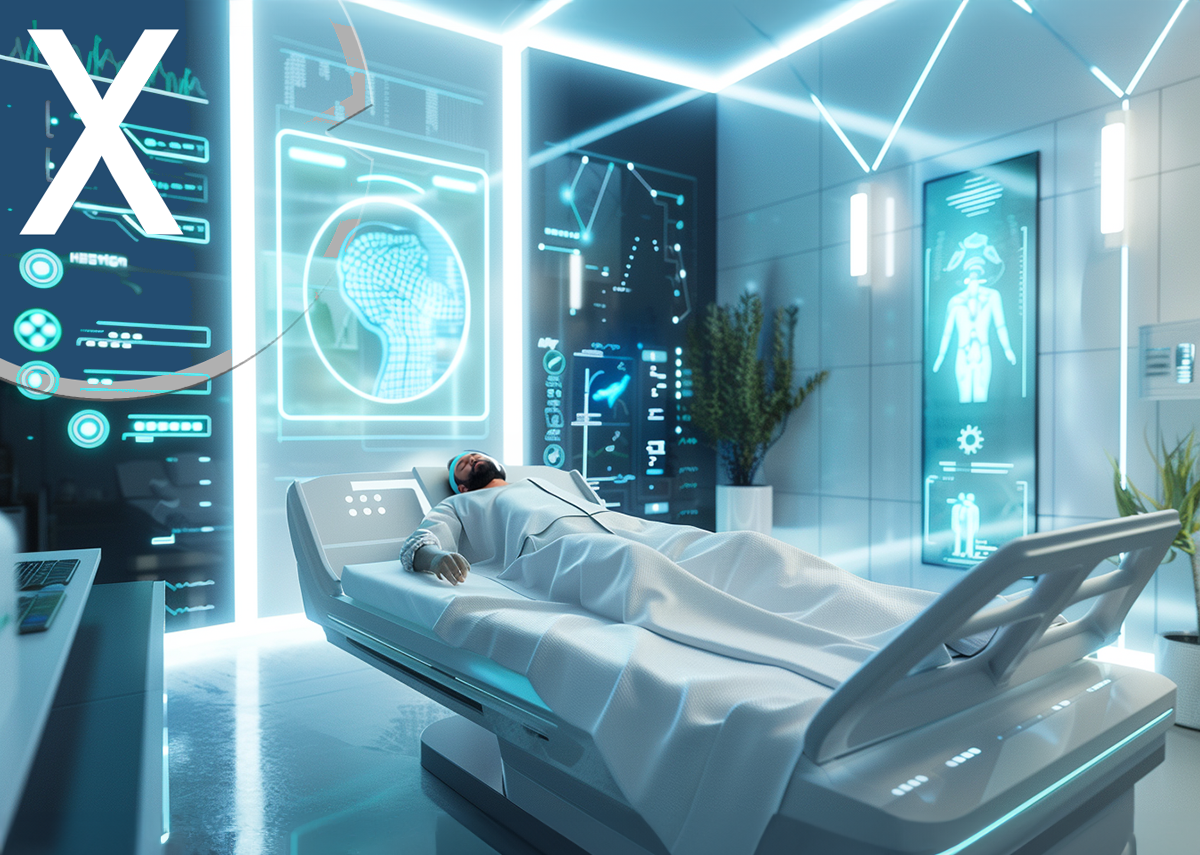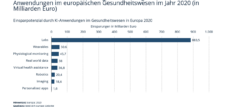
AI & Smart Healthcare: Using artificial intelligence for better healthcare services and Health Diagnosis 4.0 – Image: Xpert.Digital
🍏🥼 Artificial Intelligence in Healthcare
The integration of artificial intelligence (AI) into healthcare offers enormous potential to fundamentally transform how medical services are delivered. From precise diagnoses and personalized treatment methods to the efficient management of healthcare facilities, AI technologies open up numerous opportunities to improve the efficiency and quality of care. The following provides a comprehensive overview of the various applications of AI in healthcare, highlights the associated cost savings, and offers insights into the dynamic startup landscape in this field.
💡👩⚕️ Application areas of AI in healthcare
1. Clinical intelligence and intervention capability
AI can help analyze patient data to make better clinical decisions. It can identify patterns in large datasets that are difficult for human doctors to recognize. This leads to more accurate diagnoses and personalized treatment plans.
2. Screening and diagnostics
The use of AI algorithms can enable the early detection of diseases. For example, algorithms can analyze imaging data and identify anomalies that may indicate cancer or other serious illnesses. This allows for earlier and more accurate diagnoses.
3. Virtual Healthcare
AI-based virtual assistants can care for and monitor patients by providing 24/7 accessible medical advice and assisting with appointment scheduling. This reduces the need for physical doctor visits and relieves the burden on the healthcare system.
4. Disease management and therapy
AI systems can support patients with chronic illnesses by creating and adapting personalized therapy plans. These systems can continuously monitor health status and make adjustments as needed.
5. Emergency care (online and offline)
In emergency situations, AI systems can quickly make life-saving decisions by analyzing available data and recommending the best possible actions. This can be crucial in emergency services and emergency rooms.
6. Drug Development
AI is revolutionizing drug development by accelerating the analysis of large datasets and identifying new potential drugs. This significantly shortens development times and reduces the cost of new medications.
7. Automation and Digitalization
Automating administrative tasks through AI, such as appointment scheduling, billing, and patient registration, improves efficiency and reduces errors. This gives medical staff more time for patient care.
8. Health plans and performance management
AI can assist in managing healthcare plans by using data analytics to evaluate treatment plans and their success. This enables better resource allocation and optimized patient care.
9. Real-World Evidence (RWE)
By analyzing real patient data, AI systems can provide valuable insights into the effectiveness of treatments and medications. These findings can contribute to improving clinical guidelines and developing new therapeutic approaches.
10. Specialized care (online and offline)
AI can support specialized care services both online and offline by creating and continuously monitoring personalized care plans. This is particularly valuable for patients with complex health needs.
💰📉 Potential savings through AI in healthcare
Potential financial savings through selected AI applications in European healthcare in billions of euros – Image: Xpert.Digital
The use of AI in healthcare can lead to significant financial savings. A study by MedTech Europe and Deloitte shows that the potential savings in Europe from selected AI applications amounted to several billion euros in 2020. Here are some of the key areas where savings are possible:
- Laboratory diagnostics: 883.5 billion euros
- Wearable technologies: 50.6 billion euros
- Physiological monitoring: 45.7 billion euros
- Real-World Data (Real-World Evidence - RWE): 38 billion euros
- Virtual health assistants: 36.8 billion euros
- Robotics in surgery: 20.4 billion euros
- Medical imaging: 18.6 billion euros
- Personalized health apps: 1.6 billion euros
These savings result mainly from increased efficiency, reduced errors, and optimized treatment processes through the use of AI.
🚀🌐 The AI start-up scene in healthcare
Innovation in AI for healthcare is being driven largely by startups. An analysis of the most promising digital health startups worldwide in 2020 shows that a significant proportion of these companies are focused on the development and implementation of AI solutions [4 source].
1. Distribution of Digital Health Start-ups by Segment
The 150 most promising digital health startups cover a wide range of segments, including clinical intelligence, diagnostics, virtual care, disease management and drug development [4 source].
2. Distribution of German AI start-ups by industry
In Germany, AI startups are primarily active in the health & pharmaceutical, transport & mobility, manufacturing, trade & retail, and finance & insurance sectors. The health sector is particularly well represented.
3. Comparison between Germany and Israel
Compared to Germany, Israeli AI startups also have a strong presence in the healthcare sector, but also in areas such as transportation, manufacturing, and autonomous systems. This demonstrates the global importance of AI in healthcare and the innovative strength of various countries.
🔮⚖️ Future prospects and challenges
The future of AI in healthcare is promising, but it also presents challenges. Potential future developments include:
Enhanced personalization
Advanced AI algorithms could allow treatments to be tailored even more to individual patients, leading to better results and higher patient satisfaction.
Integration into the existing healthcare system
The successful integration of AI into existing healthcare systems requires the adaptation of infrastructures and processes, as well as the training of staff in the use of new technologies.
Data ethics and data protection
The use of large amounts of patient data raises questions about data protection and data security. It is crucial to develop ethical standards and legal frameworks to gain patients' trust.
Cost efficiency
Despite the potential savings, initial investments in AI technologies can be high. It is important to carefully analyze the cost-benefit ratio to ensure sustainable implementation.
🔍📝AI and its diverse applications
Artificial intelligence has the potential to fundamentally transform healthcare. Its diverse applications, from diagnostics to therapy, offer enormous opportunities to improve patient care and increase efficiency. At the same time, however, challenges such as data privacy, integration, and cost-effectiveness must be addressed to realize the full benefits of AI in healthcare. The innovative power of AI startups and the potential financial savings clearly demonstrate that the path to digitizing healthcare with AI technologies is already underway and holds a promising future.
📣 Similar topics
- 📈 AI-powered diagnoses: Precision in healthcare
- 💡 AI revolution in medicine
- 🔬 Early detection of diseases through AI
- 📱 Virtual healthcare with AI assistants
- ⚕️ Personalized therapies through artificial intelligence
- 🚑 Emergency care optimized through AI technologies
- 🧪 Drug development accelerated by AI
- 🗂️ Efficient healthcare management thanks to AI
- 📊 Real-World Evidence: Improved Treatment Strategies Through AI
- 🏥 Future prospects of artificial intelligence in healthcare
#️⃣ Hashtags: #ArtificialIntelligence #Healthcare #Diagnosis #Therapy #Efficiency
🤖📊🔍 The report 'Artificial Intelligence - Perspective of the German Economy' offers you a diverse thematic overview
Numbers, data, facts and background: Artificial intelligence – perspective of the German economy – Image: Xpert.Digital
We currently no longer offer our newer PDFs for download. These are only available upon direct request.
However, the PDF “Artificial Intelligence - Perspective of the German Economy” (96 pages) can be found in our
📜🗺️ Infotainment portal 🌟 (e.xpert.digital)
under
https://xpert.digital/x/ai-economy
with the password: xki
view.
🎯🎯🎯 Benefit from Xpert.Digital's extensive, five-fold expertise in a comprehensive service package | BD, R&D, XR, PR & Digital Visibility Optimization
Benefit from Xpert.Digital's extensive, fivefold expertise in a comprehensive service package | R&D, XR, PR & Digital Visibility Optimization - Image: Xpert.Digital
Xpert.Digital has in-depth knowledge of various industries. This allows us to develop tailor-made strategies that are tailored precisely to the requirements and challenges of your specific market segment. By continually analyzing market trends and following industry developments, we can act with foresight and offer innovative solutions. Through the combination of experience and knowledge, we generate added value and give our customers a decisive competitive advantage.
More about it here:
🏥🕶️ Real-World Evidence (RWE), Virtual Health Assistants and Diagnostics 4.0 – Is this the Healthcare Metaverse?
Digitalization is permeating almost all areas of life, and healthcare is no exception. In this context, buzzwords like Real-World Evidence (RWE), Virtual Health Assistants, and Diagnostics 4.0 keep cropping up. But what exactly do these terms mean, and how do they fit together? Do they create a "Healthcare Metaverse"?
More about it here:
We are there for you - advice - planning - implementation - project management
☑️ Industry expert, here with his own Xpert.Digital industry hub with over 2,500 specialist articles
I would be happy to serve as your personal advisor.
You can contact me by filling out the contact form below or simply call me on +49 89 89 674 804 (Munich) .
I'm looking forward to our joint project.
Xpert.Digital - Konrad Wolfenstein
Xpert.Digital is a hub for industry with a focus on digitalization, mechanical engineering, logistics/intralogistics and photovoltaics.
With our 360° business development solution, we support well-known companies from new business to after sales.
Market intelligence, smarketing, marketing automation, content development, PR, mail campaigns, personalized social media and lead nurturing are part of our digital tools.
You can find out more at: www.xpert.digital - www.xpert.solar - www.xpert.plus

